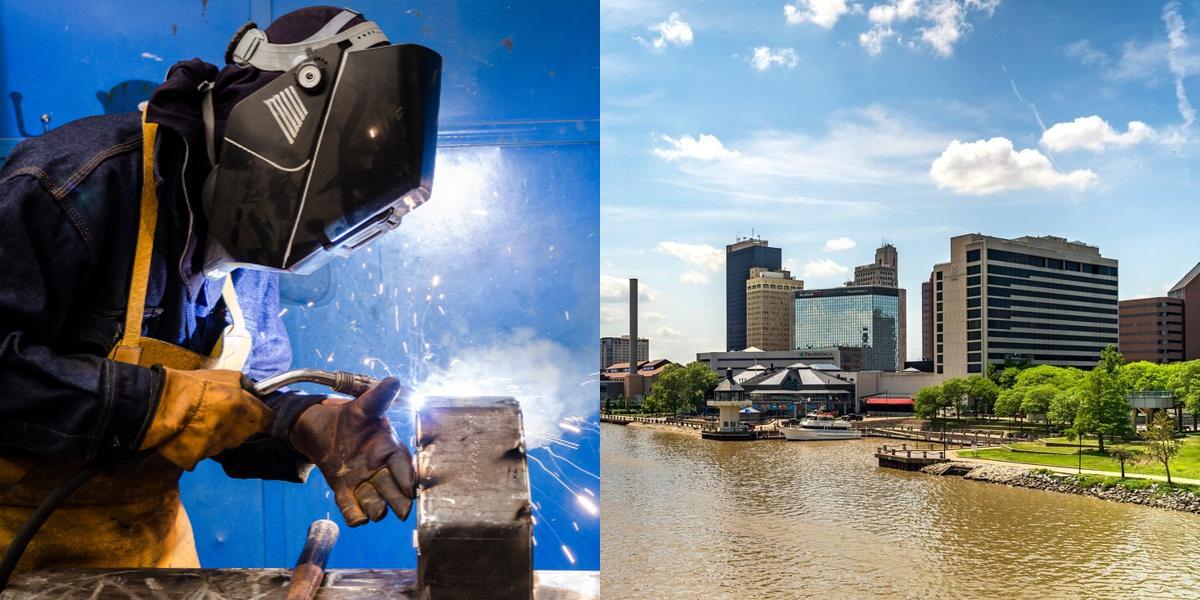How to Become a Welder in Ohio

Ohio is home to a strong manufacturing and construction industry, making welding one of the state’s most in-demand skilled trades. According to the Bureau of Labor Statistics, welders, cutters, solderers, and brazers in Ohio earn an average of $52,210 per year ($25.10/hour). If you enjoy hands-on work and want a stable career with growth potential, becoming a welder could be a rewarding path.
Where to Find Welder Classes in Ohio?
If you're interested in pursuing a career as a welder in Ohio, Dreambound is the largest platform for students to find and compare vocational training programs. These programs provide the necessary training and certification preparation to kickstart your career in welding.
Dreambound's platform allows you to easily search and filter welding training programs based on location, cost, duration, and accreditation. It also provides user reviews and ratings to help you make informed decisions about the best program for your needs. By using Dreambound, you can find welding classes near you and take the first step towards becoming a welder in Ohio.
How Long Does It Take to Become a Welder?
Becoming a fully certified welder typically takes 6 months to 2 years, depending on:
- Training program type
- Hands-on practice hours
- Time to schedule and pass certification exams
AWS and ASME certifications both require maintenance or renewal to stay active.
Career Paths and Opportunities after Becoming a Welder
Becoming a welder opens up various career paths and opportunities. Here are a few options to consider:
Pipe Welder
Pipe welding involves joining pipes together using various welding techniques. Pipe welders are in high demand in industries such as oil and gas, construction, and manufacturing. With experience and additional certifications, pipe welders can advance to supervisory or inspection roles.
Structural Welder
Structural welders specialize in welding metal components to construct buildings, bridges, and other structures. This field offers opportunities to work on large-scale projects and can lead to supervisory positions or project management roles.
Underwater Welder
Underwater welding combines diving skills with welding expertise. Underwater welders work in environments such as offshore oil rigs, shipyards, and underwater construction projects. This specialized field requires additional training and certifications in diving techniques and safety.
Welding Inspector
Welding inspectors ensure that welding work meets industry standards and specifications. They inspect welds for quality, accuracy, and adherence to safety protocols. With experience and additional certifications, welding inspectors can advance to higher-level inspection roles or become quality control managers.
Welding Educator or Trainer
Experienced welders can pursue a career in education by becoming welding educators or trainers. They teach aspiring welders the necessary skills and knowledge through vocational schools, community colleges, or apprenticeship programs. This career path allows individuals to share their expertise and contribute to the growth of the welding industry.
How Much Do Welders Make in Ohio?
Per the Bureau of Labor Statistics, welders in Ohio earn $52,210 per year ($25.10/hour). Specialized roles, such as pipe or underwater welding, can reach $70,000+ annually with additional endorsements.
Frequently Asked Questions
How long does it take to become a welder in Ohio?
Typically 6 months to 2 years, depending on program type and certification path.
How much do welders make in Ohio?
Ohio welders earn an average of $52,210 per year or $25.10 per hour (BLS, 2024).
How to become a certified welder in Ohio?
Train at an AWS-accredited test facility or ASME-approved training center, pass your performance qualification, and maintain certification per code requirements.
What qualifications do I need to be a welder?
A high school diploma or GED, vocational training, and AWS or ASME certification are typically required
Final Thoughts
Welding remains one of Ohio’s most stable and respected trades. Whether you pursue AWS certification for structural projects or ASME accreditation for industrial systems, the skills you gain will open doors to high-demand jobs across the state.
If you’re ready to get started, explore welding programs near you on Dreambound. Compare tuition, duration, and reviews to find your ideal training path.
Are you thinking about a job change or wanting to learn more about different career paths? Feel free to check out these additional articles:




